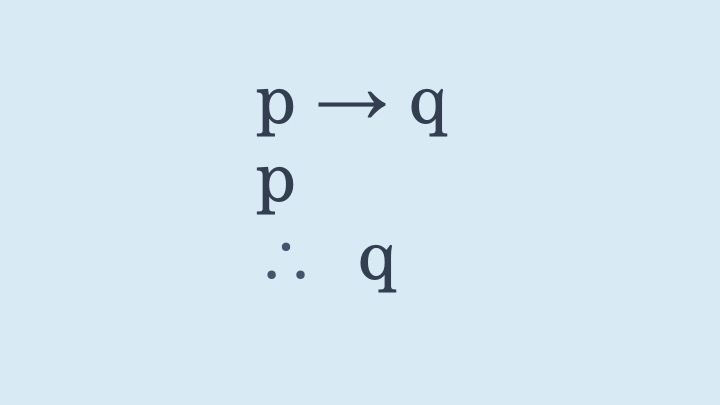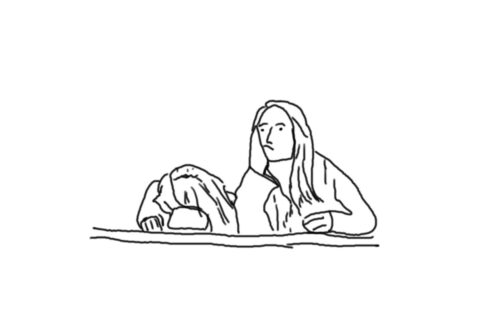There are many kinds of rules. There are rules of grammar, rules of etiquette, rules of law, and rules of inference. I’m interested in them all, but in this post, the kinds of rules that interest me are the latter kind. Here is one: ‘if p, then q. p. Therefore, q.’ The rule of inference (modus ponens) is said to be truth-preserving. If the premises are true, then it follows that the conclusion is also true.
There are two difficulties with law and order when it comes to inference. First, there is the apparent difficulty of explaining what sort of justification we could have for believing such rules of inference. Second, there is the accompanying difficulty of saying what it is to be a rule-follower. The latter question will be my particular focus here (see Paul Boghossian’s excellent selection of essays, Content and Justification, 2008 for a more extensive discussion of both issues).
There is something unique about rules of inference. They aren’t exactly like moral rules, but nor are they mere true propositions. After all, ‘if p, then q. p. Therefore, q’ is not the same as the proposition, ‘the cat is sitting on the mat.’ Though one might be able to justify one’s belief in both propositions, one doesn’t follow the latter in the same way one follows the former.
Suppose we have some form of justification for believing that modus ponens is true. What then should we say about following it? If it’s not the same as a moral rule, then what kind of following do we do? What gives it the ‘ought’?
Perhaps it is better to take a step back from the rule and ask about what it’s for. After all, modus ponens is a rule of inference that we follow in order to obtain true beliefs. If we accept as a basic norm that one ought only to believe what’s true, then modus ponens is a means to obtain only those true beliefs. Perhaps, then, it is an instrumental kind of rule: the best means of meeting another obligation (to believe only what is true).
However, the rule itself can’t merely be instrumental, as if any means that gets us what we want will do. This is because to meet an obligation to arrive only at true beliefs, we can’t also accept that rules of inference could be false. If the rule is only instrumentally rule-like, then belief in its truth is not relevant. It could very well be false. We just follow it because it works.
This view would subvert the basic obligation to believe only what is true. If it did turn out that the rule is false, then we’d have no justification for beliefs derived from its use. Thus, the rule can’t merely be instrumentally justified. Thus, it cannot be the case that rule following is merely constituted by means-end practical considerations. So what is it?
There appear only a limited number of options. The first option is to accept that rules are conventions agreed upon by social groups. If a rule is adopted by a group, then to follow it is to follow a convention. However, following here is not clearly understood. If by following we mean ‘has a reason’, then the reason must be granted by a truth-preserving inference. If so, then having a reason presupposes some non-conventionally derived inference. If so, then following conventions are not what we mean by following rules of inference.
Alternatively, following a rule amounts to fulfilling an obligation to a social group. We are told ‘modus ponens!’ However, if obligation amounts to convention and following it amounts to doing as I am told, then it follows that a social group could just as easily command ‘do not modus ponens!’ But in this case, we would have no way to justify modus ponens. I might have a reason for doing as I’m told, but not for believing modus ponens to be true.
The second option is to accept that rules are not decided by anyone. They are immutable laws of thought, part of the reality in which we live. Call this view the object view. We discover them as we think. Let’s say that they are. Could their presence in the universe require us to live by them? Surely, following would amount to possessing a reason and then applying the rule. But that falls short of what we want. Possessing a reason to believe a rule is true and then following the rule falls short of the idea that we ought to follow the rule.
What we mean by rule following is not merely a fact about what we do; it is about what we think we ought to do. Following a rule of inference is not like following a path through the woods. We don’t think of the path in the wood as obligatory. In contrast, rules of inference carry a form of quasi-morality. We have obligations to the rules.
In contrast to the convention view in which obligations are easily generated, the object view has no resources to explain the obligatory nature of rules. So, how to square the circle?
The view, once suggested by Robert Adams, is that obligations are fundamentally social. If no social context, then no obligation. We are only obligated to another person. We cannot be obligated to a rule if the rule is merely a truth. The truth is only a necessary condition for obligation. What obligations requires as a sufficient condition is the additional feature of owing someone something.
If that is what we mean by obligation and rules of inference bestow on us thinkers the obligation to follow them, then there must be a social context in which obedience to the rule is required. However, as we have seen with the conventional view of rules, social groups don’t have to pick one rule over another. The social group must not only pick the rule; they must have some obligation to do so.
Adams’ insight is that God himself is the person to whom we owe our logical obedience to rules of thought. If modus ponens is one of them, then we owe it to Him to think according to it.
Boghossian’s answer is to split the difference. He takes the view that the rule is an abstract object but that it is not sufficient to grant obligations without some moral component. Boghossian says that the moral component is granted by a social group agreeing to follow the rule:
“When one is born into a society that has accepted certain norms and lives by them, and if one continues to live with and benefit from that society, then, other things being equal, one is obligated to live by the norms that are accepted in that society.”
However, as I mentioned, the rule itself contains no obligation. If so, the group have no reason to make it obligatory. They only have a reason to think it is true. But, as I have argued, obligations of a rule don’t supervene on its truth. If not, then a social group must decide to make a rule obligatory. But then the rule is not normative at all. It is merely a truth about reasoning.
Thus, if there is an obligation to obey a law of inference, this fact provides some evidence for the existence of a rational being to whom we owe our inferences.





